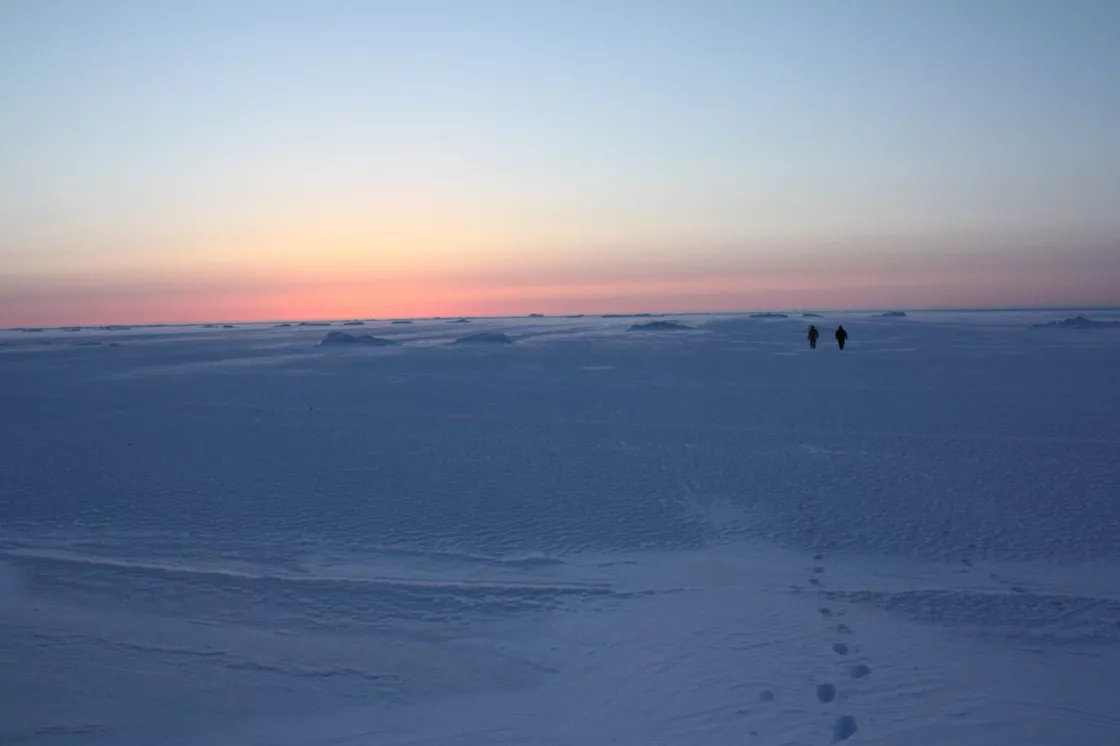As climate change warms the Arctic more than twice as fast as the rest of the planet, new challenges abound for the communities that live in the region, including food sovereignty, coastal erosion, increasing shipping traffic and more. The National Science Foundation’s Navigating the New Arctic (NNA) initiative aims to improve our understanding of the rapid, dramatic changes taking place in the region in order to better mitigate these challenges. Beginning February 1, 2021, Alaska Pacific University (APU), the University of Alaska Fairbanks (UAF), and the University of Colorado Boulder (CU Boulder) will host the Navigating the New Arctic Community Office (NNA-CO). Over the next five years, these universities will work together to provide leadership and support to researchers and Arctic communities to address this region’s biggest climate-related threats.
Navigating the New Arctic projects work to improve understanding of Arctic change and its impacts through convergence research, a unique approach to research that relies on the merging of ideas from different areas of expertise, including Indigenous knowledge. In the case of the NNA program, these different perspectives are necessary to inform the economy, security, and resilience of the U.S. and circumpolar Arctic.
“This office will bring people together to identify new ways to understand the holistic nature of Arctic systems, to learn from Arctic peoples who are adapting on the frontlines of change and to envision new and creative approaches to sharing knowledge across cultures and worldviews,” said Matthew Druckenmiller, director of the NNA-CO and scientist at CU Boulder’s National Snow and Ice Data Center. “Our diverse and dedicated team acknowledges the scale and responsibility of what we're looking to do, which is to promote new ways of partnering—ways that are equitable and that unite us in our work toward a more resilient Arctic.”
The community office will support the goals of NNA by focusing on four key areas: co-production of knowledge with Indigenous Peoples, convergence research, culturally responsive education and outreach, and open science. The NNA-CO will work to increase recognition of Indigenous knowledge and data sovereignty as well as promote inclusive and collaborative research design and implementation. Research and Indigenous advisory boards, facilitated by Dr. Nikoosh Carlo (Koyukon Athabascan), will guide the NNA-CO, offering expertise and advice on tackling both persistent and emerging challenges to collaborative, equitable and action-oriented research.
“We have an opportunity with this NNA-CO office to listen and engage broadly on the diverse perspectives that exist on topics such as co-production of knowledge and how to ensure that Arctic research is relevant, recognizes past issues and takes thoughtful and appropriate steps to build new relationships,” said Dr. Carlo. One of the first actions of the NNA-CO will be to assess barriers and opportunities created by the COVID-19 pandemic, which has imposed substantial and sustained constraints on Arctic communities and researchers, though in very different ways.
CU Boulder will host the central office for the NNA, partnering with APU and UAF to serve Alaska and the broader Arctic. Each organization will bring many strengths to the office. The CU Boulder team includes research specialists from the National Snow and Ice Data Center (NSIDC), the Cooperative Institute for Research in Environmental Sciences (CIRES) and the Institute of Arctic and Alpine Research (INSTAAR). APU, a Tribally controlled, Alaska Native-serving institution, will implement a Community Extension Office for Arctic communities, facilitating local and regional research partnerships to address community-defined issues and ensuring NNA research integrates Indigenous cultures, knowledge systems and research needs. UAF will host an Education and Outreach Field Office to facilitate connections among teachers and students, NNA researchers and communities across Alaska to maintain coordinated, culturally appropriate and place-based education and outreach activities.
“We welcome the opportunity to collaborate with other universities on Arctic research, and look forward to serving as a hub for Indigenous engagement,” said Valerie Nurr’araaluk Davidson (Yup’ik), president of Alaska Pacific University. “At APU, we are committed to honoring Alaska's Indigenous heritage and preparing the next generation of Alaska’s leaders. Collaborative community-based research in the Arctic will benefit our country and our region, as well as our students and their communities. When it comes to research, Indigenous peoples often use the phrase, ‘Nothing about us without us is for us.’ We look forward to sharing our knowledge and passion for our homelands with our university partners as we collectively develop and support the goals of the NSF NNA Community Office.”
Successful NNA-CO development and activities will create an integrated and diverse network of researchers, Arctic communities, and other partners that are working together to tackle the pressing challenges created by an Arctic in profound transition. The result will be stronger connections between Arctic communities and the Arctic research community, a research enterprise that is highly responsive to a rapidly changing environment and a more integrated, equitable and resilient path forward for NSF Arctic activities.
More information about the NNA-CO and its team can be found here. News relevant to the NNA-CO will be shared via Twitter @ArcticTogether. Read the NSF announcement here.
